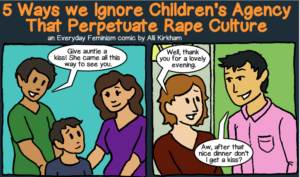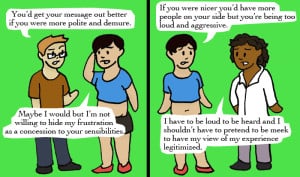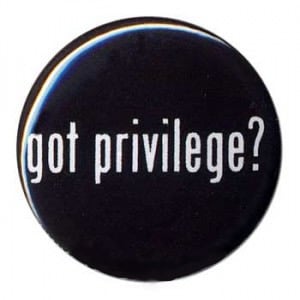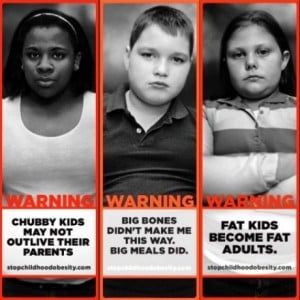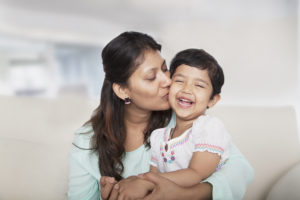
An adult kisses a smiling child who sits on their lap.
In our culture, there’s a lot of shame to go around. For folks who are parenting while poor, a heady brew of isms – including not only classism but often racism and sexism – swirl together with the generally high degree of scrutiny all parents face to create a perfect storm of stigma.
The media shames poor parents. Politicians shame poor parents. Other parents shame poor parents. My gosh, even people with no idea what it’s like to be a parent shame poor parents! At the crux of their argument is often an offensive idea of the poor parent as a monolith: An uneducated, unhealthy, monolith ill-suited to raise kids.
There is a pervasive idea in our culture that poor parents are acting irresponsibly by bringing kids into the world that they can’t afford or can’t afford to do better by. There’s a pervasive idea in our culture that poor parents are inferior parents because they can’t raise their kids up to the arbitrary standards put in place by Pinterest boards and parenting magazines.
Those pervasive ideas are bullshit, and the only reason they’re so popular is because classism is so deeply engrained in our society that we don’t even notice it when we’re scrolling past a new post on a mommy blog.
In ways that are both explicit and implicit, the notion of a “good” parent in our society is inextricably tied up with class.
“Good” parents are feeding their kids organic veggies for lunch, dropping them off at elite – and expensive – preschools and daycares, buying the latest and greatest educational toys or iPad apps.
“Good” parents save up enough money to pay for their kids to go to competitive colleges and have a destination wedding right after. The kids of “good” parents might even be lucky enough to get cars when they’re old enough to drive, get help buying their first home, and get a leg-up in their careers because of the connections their parents can pass along to them.
These are all great things, don’t get me wrong. Every child should have healthy food to eat, a quality education to guide them forward, and a fun game to play after school that feeds their brain. But that’s not all that matters, and what it communicates on the flip side isn’t okay.
When we call affluent parents “good” parents just because of what they can afford to give their children, what we’re really saying is that poor parents are “bad” parents. And I, for one, deeply disagree with that.
I was raised by a poor single mom, and not to brag but I mean, I turned out kind of awesome. My mom loved us deeply and dearly. She gave us everything she could. And even if we weren’t always able to bring the best supplies to school or wear the latest fashions, even if we went to public schools and spent nights awake applying for scholarships so we could go to college, even if we ate fast food sometimes and didn’t shop in the organic section (still don’t, sorry not sorry), my brother and I had a solid foundation of love and light in our lives.
We worked hard, earned our way, and made something of ourselves. The rumors weren’t true. We didn’t flunk out or drop out. We didn’t become addicts or criminals. (Not that I judge.) We went to high-ranking colleges, grew up into empathetic intellectuals, and we work in full-time jobs in the fields we always wanted to work in.
A relatively equal share of parents across income levels reported that they see themselves as good or great parents to Pew, despite lower-income parents honestly responding to other questions about the challenges they face raising kids in more dangerous neighborhoods, attempting to provide their kids with experiences they can’t afford, and accessing quality care and education for their children.
A relatively equal amount of parents across income levels are also seriously invested and involved in their children’s education – meaning they attend PTA meetings, talk to teachers about their kid’s progress, and attend field trips and school events to support their children and the larger community of children in their neighborhoods.
Poorer parents, specifically of color, are more likely to prioritize teaching their children respect and responsibility than middle- and upper-class families. Some affluent children are more likely to struggle with mental health problems and behavioral issues than their poorer peers, despite the stressors of living in a lower-class household that those peers face on a daily basis.
It isn’t truly possible to make the case that all rich parents are good and all poor parents are bad. There isn’t even truly a case to be made that the amount of money in a family’s bank account will determine their child’s happiness, or how much a child is loved and supported, or what kind of parent a child will have.
That’s because our socioeconomic statuses don’t actually define us: As people, as communities, as parents. And the longer we pretend they do, the longer we’re buying into classism.
Despite the many nuances of parenting, we tend to think of it in black-and-white terms. Parents are either doing things the “right” way or the “wrong” way. You’re either a good mom who breastfeeds or you’re not. You’re either a bad mom who spanks or you’re not. You’re either a successful parent with Ivy League grads in your living room on Christmas Day or you’re not.
But parenting isn’t that easy to crystallize.
When we define “good” parenting through material items and other things that come with a price tag, we’re no longer measuring parenting based on what parenting is truly about: Teaching your children to grow up into good, solid, moral people; modeling empathy and compassion; encouraging your kids to live their dreams and supporting them even when they mess up; whispering radical social justice phrases into your baby’s crib in the middle of the night.
Instead, we’ve started measuring “good” parenting in terms of affluence and access. That’s what makes the entanglement of “good” parenting and “wealthy” parenting so easy, and that’s what perpetuates a classist society in which our worth as human beings is determined by our affluence.
When we look at poor parents through a classist lens, we see them and their lives as defined only by failure to reach some sort of mark of success in a capitalist society. When we consider how hard poor parents are working to provide their kids with stable, loving homes in the face of discrimination, stigma and financial insecurity, what shines through is much different. That difference is key – because it’s proof that the notion of all poor parents being bad parents is truly just a problematic stereotype in a pretty bad disguise.
Ultimately, though, what’s really wrong with shaming poor parents is that they don’t deserve the brunt of criticism for our classist, capitalist society.
The problem isn’t that poor people should “know better” than to have kids. The problem isn’t that poor people are short-changing their kids by raising them without the creature comforts some of us held near and dear as kids. The problem is that we live in a society where parents aren’t supported, poor people aren’t supported, and wild wealth gaps define our lives.
I’ve written before about the idea that shaming the poor only shifts accountability away from the real “bad guys” who are stacking the odds against us all. Shaming poor parents is no exception.
Many of the odds stacked against poor parents are rooted in a classist society that isn’t giving any of us the stuff we need to survive and thrive.
Teachers short-change poor kids because they expect less of them. Doctors are more likely to accuse poor parents of abuse. Growing up poor puts you at a higher risk of poor health and risky behaviors. Financial insecurity or instability can make it harder for parents to pay for extracurricular activities. And across income groups, finding affordable child care that’s high-quality and affordable is tough – even moreso for poorer parents, who often end up entrusting their kids to family members or friends instead of day care centers or preschools.
The solution to those problems isn’t simply to ensure that the only parents out there are wealthy parents.
The solution to those problems is putting an end, once and for all, to a culture where our worth is tied to our financial assets.
Teachers shouldn’t assume poor kids have no futures; instead, they should be equipped to help those kids go as far as possible and reassure them that they have just as much a right to do so as anyone else. Doctors shouldn’t profile poor parents; instead, they should be interested in making sure poor parents have access to the kind of nutritional information and health products that can set their children on a path to healthy adulthood.
Schools, day care centers, after-school care, and even nannies and other childcare shouldn’t come at a price tag so high that parents can’t afford to ensure their kids are in good hands. Similarly, public schools should be equitably and fairly funded in every community to ensure that kids like me – who grow up in the public school system – aren’t being left behind because of it.
Instead of laying the blame for the challenges they face on poor parents and their families, maybe it’s time we took a wider look at what’s going on here.
Maybe it’s time we decided it isn’t poor parents who have failed their kids; it’s a society that lets their kids fall through the cracks. Maybe instead of preaching to and about poor parents about the notion of personal responsibility and good parenting, we should be more interested in figuring out how to make sure poor parents can make ends meet so they can spend quality time with their children and keep them safe and sound.
It’s undeniable that being poor while parenting puts you – and your children – at a disadvantage. But it isn’t true that those disadvantages are the responsibilities of the poor alone to fix. And it isn’t true that those challenges define who people are as parents, or who their children will come to be.
[do_widget id=’text-101′]
Carmen Rios is a Contributing Writer for Everyday Feminism. She splits her time disparately between feminist rabble-rousing, writing, public speaking, and flower-picking. A professional feminist by day and overemotional writer by night, Carmen is currently Communications Coordinator at the Feminist Majority Foundation and the Feminism and Community Editor at Autostraddle. You can follow her on Twitter @carmenriosss and Tumblr to learn more about her feelings.
Search our 3000+ articles!
Read our articles about:
Our online racial justice training
Used by hundreds of universities, non-profits, and businesses.
Click to learn more









